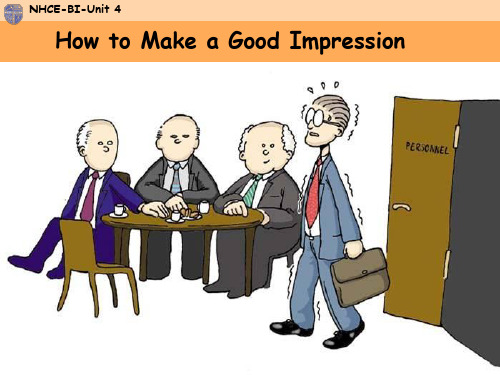新视野大学英语第一册U4SectionA
新视野大学英语第一册教案UNIT 4

Unit 4 Section A How to Make a Good Impression Teaching Objectives:1. to grasp the main idea ( qualities that we can use to impress others.)2. to master the key language points and grammatical structures in the text;3. to conduct a serious of reading, listening, speaking and writing activities related to the theme of the unit.Importance and difficulties:1. The whole text structure & the main idea2. New words and key sentence patterns3. Writing skill:a general statement support by a list of things or examples.Basic materials and references:1.new horizon college English and reference book for teaching2.other reading materials and pictures3.使用多媒体演示文稿,使用电脑磁带复读机及语音教室训练听力,在网上进行教师与学生的教学互动Lesson procedure:(4 periods)Period 1 (20mins)Period 2 (3 classes)Period 3 (1 class)Period 4 (1.5 classes)Warm-up exercises Global reading Detailed reading ofSection AAfter readingactivitiesSection BTeaching procedure:Period 1:(20mins)I. Warm-up activities1. How long does it take us to judge the people we meet?------we judge other people within the first seven seconds of meeting them.2. What is one way you can have a positive effect on other people?-----by using unspoken languages, such as eye contacts, facial expressions and body movements.II. Global Reading:Main idea of the text: In the passage, several points that we can make use of to impress others are listed: you are the message; be yourself; use your eyes; and lighten up.Period 2: (3 classes)III. New vocabulary and language pointsA.New vocabulary: .1. impression:n. 1. the effect produced in someone's mind 印象,效果He has told me his plan and he's made a good impression on me.2. an idea or opinion that one forms about something 感觉,感想I have the impression that he's not pleased.2. conscious:n. 1. realizing something 感觉到,意识到The children were conscious of their mother's unhappiness.2. fully awake; knowing what is happening around 处于清醒状态,有知觉的The patient was conscious. 这位病人处于清醒状态。
新视野大学英语第一册U4 Section A

Inspiring your thoughts
2. What did the priest mean when he said “Dory didn’t die a hero; he lived a hero.”? The priest meant that Dory was a hero not just because he gave his life for his wife, but also because he had been known for his remarkable spirit and love of humanity when he was alive.
Inspiring your thoughts
1. Why was Daniel Hernandez regarded as a hero? Because during a mass shooting in Tucson, Daniel Hernandez courageously ran through the danger to save one unit
1. It tells about the story of Forrest’s saving his companions in the war. 2. He couldn’t let them lay there all alone, scared, so he grabbed them up and run them out of there …
Inspiring your thoughts
3. How does today’s notion of hero differ from that in the past? In the past, heroes were those who acted courageously beyond the call of duty or great leaders, while today’s heroes can be average men and women.
新视野第三版第一册Unit4

Main idea & structure
Main ideas of the parts
What thesis statement does the author make about heroes today? (Para.1)
Tips The word“hero” becomes more common and is used to refer to both victims and survivors of all kinds of difficulties and tragedies.
demAofrcicraacnyNinatSioonuatlhCAofrnicgaress • receive the 1993 Nobel Peace Prize
Section A Heroes among us
Text study
Main idea & structure Language focus Critical thinking
Short answer questions
2. What makes a hero in your eyes?
Tips
•A good heart •The readiness to lend a hand to people in trouble •The courage to risk one’s own life to help others in danger •The determination to fight for his own country and people
What conclusion does the author draw from the two examples? ( Para.4)
新视野大学英语第一册 Unit 4 Body Language

unconscious a. 无意识的,昏迷的
consciousness n. 意识,知觉
易混
conscientious a. 认真的,诚心诚意的 be conscious of /that 意识到…
考点
Word Discrimination: conscious & aware
conscious: 表示内心所意识到的感觉; aware :指感官上的感觉; ___ One may be conscious of fear, but not altogether aware of the danger which is going on about one. 人们可能会心感恐惧, 但不能全然觉察到周围将发生什么危险。
• Victory/win! • I love you! • Ok!
Be quiet!
Call me!
Stop!
Let’s do a quiz.
confident/confused confused
inspired/disappointed inspired
regretful/excited regretful
Make the list of feelings and act it out
Meaning Action 1.
1. You are welcome.
●
A smile and a handshake or holding head
2. I am worried 3. I ate too much!
examples
idea
例子
4. Lighten up.(放松) 写段落: idea + examples
新视野大学英语第一册第四单元

MENU
NHCE-BI-Unit 4
II: Preview
E. Why do the American couples feel uneasy when their Chinese neighbor fondles or teases their baby whenever they meet?
F. When a North American and a Mexican are talking, why do they end up their short conversation at the other end of the room?
interest of others
NHCE-BI-Unit 4
IV: Section A--Text
2. Questions to Comprehension
1) What does “be yourself” mean?
MENU
NHCE-BI-Unit 4
III: Leading-in
MENU
NHCE-BI-Unit 4
III: Leading-in
How did you get your judgments on the woman?
unspoken / non-verbal communication (consciously or unconsciously):
C. How does the American feel when the Chinese students always keep silence in class even when he asks them to raise questions?
D. Why don’t Americans like the speakers who bury their noses in his manuscript?
新视野英语第一册U4笔记

新视野英语第一册U4笔记Unit4 Section A How to Make a Good Impression一、Main idea of the textWhen people want to make a good impression, the following advice can be of some help: you are the message; be yourself; use your eyes; and lighten up.二、Devices1. Listing (列举法)1)He gives his four pieces of advice on ―How to Make a GoodImpression‖by listing and expounding one after another:You are the message. (Para.3)Be yourself. (Para. 6)Use your eyes. (Para.10)Lighten up. (Para. 12)2) The writer supports his general statements very effectively through a list of examples, without having to go into details about them.Example 1: (His idea: We make up our minds about people within seven seconds of meeting them.)Think about some of your most unforgettable meetings: an introduction to your future spouse, a job interview, an encounter with a stranger. Focus on the first seven seconds. What did you feel and think? (L.5-6)2. Questioning(设问法)The writer presents and expounds his ideas by asking a list of questions, thus arousing an active echo in the reader’s mind, and then bringing the reader round to his ways of thinking.The Title:How to Make a Good ImpressionPart I:Focus on the first seven seconds. What did you feel andthink? How did you “read” the other per son? How do you think he read you? (Para. 2) Part II:Think of times when you know you made a good impression. What made you successful? (Para.5)Part II I:Take a good look at yourself. Do you say “I” too often? Are you usuallyfocused on your own problems? Do you complain frequently? If you answered yes to even one of these questions, you need to lighten up.(Para. 15)3. Exemplification (举例法)Exemplificati on is applied to make the author’s advice or opinion more authentic and persuasive. And it is employed in the second part of the article as follows:1)For 25 years I’ve worked with thousands who want to be successful. I’ve helped them make persuasive prese ntations, answer unfriendly questions, communicate more effectively. The secret has always been you are the message. (Para.3)4. Deduction (演绎法) (Para.6 – 11)三、Compatible Expressions1.对…的判断to make up one’s mind about sb. /sth.eg: It’s still premature to make up your mind about your future career.现在决定自己的未来职业为时尚早。
新版新视野大学英语第一册Unit4 SectionA单词和例句

新视野大学英语读写教程(第二版)第一册单词表Unit 4 Section A How to Make a Good ImpressionNew Words<1>impression n. [C] an opinion or feeling about sb. or sth. 印象He has made a good impression on me. 他给我留下了很好的印象。
My first impression of him was favorable. 我对他的第一印象很好。
<2>conscious a. 1. noticing or realizing sth. 有意识的;意识到的The children were conscious of their mother's unhappiness. 孩子们意识到了母亲的不快。
I became conscious of someone watching me. 我意识到有人在看着我。
2. awake and knowing what is happening around 清醒的;有知觉的The patient was conscious. 这位病人处于清醒状态。
He was found lying beside the road, covered in blood but still conscious. 人们发现他躺在路边,浑身上下都是血,可神志还是清醒的。
<3><em>consciously<em> ad. aware of having done sth. 有意识地;有知觉地I don't think she's consciously rude to everyone. 我想她不是有意对大家无礼的。
He did not consciously remember meeting her. 他不记得见过她。
新视野英语教程book1Unit4-Section A

Chinese
Text A Para. 6-7
Unit Four
“What do all you people do?”
“We give the computer the information about your trip, and then it tells us whether you can fly with us or not.”
Text A Para. 26-31
Chinese
Unit Four
1
The computer is down.
Meaning: The computer doesn’t work.
Meaning of the Sentences
Unit Four
2
I hear it more and more as I go about trying to do my business.
Chinese
Text A Para. 21-25
Unit Four
“Is there any other plane flying to Washington within the next few hours?” “I wouldn’t know,” he said, pointing to the dark screen. “Only IT knows.”
Exercise
Unit Four
Warming up
Activity I Spot Dictation Activity II Watch and Discuss
Spot Dictation
Unit Four
Directions: The following paragraph is taken from Text A. Listen carefully and fill in the blanks without referring to the original text.
